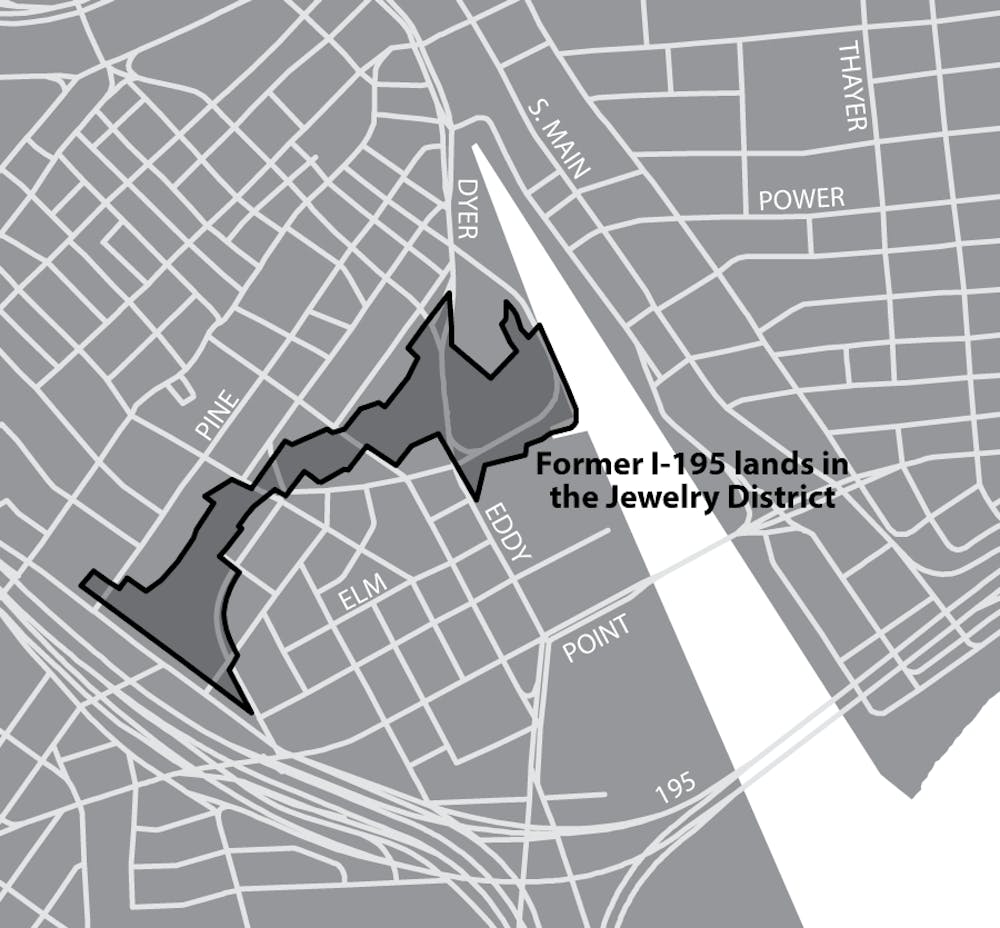Developments in the Jewelry District are well underway for Rhode Island universities hoping to take advantage of the growing “Knowledge District” — a term local universities and politicians have been using to define the approximately 19 acres of space for urban development downtown that was freed by the I-195 relocation project.
For the area neighboring the University’s new Alpert Medical School building, Johnson and Wales University has plans to build up to three academic buildings and renovate an existing building, and the University of Rhode Island and Rhode Island College plan to bring a nursing school facility to the area, said Lisa Pelosi, director of the office of communications and media relations for JWU.
Mayor Angel Taveras, the Providence Department of Planning and Development and a special advisory committee created the Providence Downtown and Knowledge District Plan in 2012, which states priorities and goals for the area as it develops, said Robert Azar, acting director of current planning for Providence.
The vision for the area is to create a centrally located “place that has a mix of all kinds of different uses with a focus on knowledge industries,” Azar said. “That includes education and healthcare institutions, research and development and supportive services.”
Development in the area will be a way to “harness emerging knowledge-based industrial development to create jobs, drive innovation and entrepreneurship, improve sustainability and enhance public health and quality of life,” Taveras wrote in an introduction to the plan.
The plan was meant to serve as a kind of blueprint for directing the city, businesses and institutions with an interest in expanding into the area, which include Brown, JWU, Rhode Island College and URI, Azar said.
“As an outgrowth of (the plan) we created new zoning regulations that allow for the growth of those type of uses,” Azar said.
Master plans, which lay out long-term visions for the developments of university campuses in the area, have to be reviewed by the city, Pelosi said.
“We feel that having the institutions in close proximity fosters collaboration, and we hope that it will result in spin-off businesses,” Azar said. “It’s not just collaboration, but also the opportunity to share facilities.”
URI and Rhode Island College announced their plans for a shared nursing school facility in 2010, The Herald previously reported.
The plans were made possible by Question 3 on the ballot last November, said Jane Williams, dean and professor of nursing at Rhode Island College. The vote approved borrowing nearly $132 million for a new shared building, according to Providence Business News.
A feasibility study was completed a year and a half ago, though planning is still underway, Williams said.
“What we’re focused on right now is the renovation and expansion of our campus,” she said.
Sharing facilities should allow institutions to purchase more expensive equipment that may have made little sense for both to purchase individually, Azar said.
“Such a facility would be equipped with the latest technology and would allow URI and RIC to increase combined undergraduate enrollment,” wrote Dave Lavallee, assistant director of communications and marketing for URI, in the URI alumni magazine.
Meanwhile JWU completed a purchase of two parcels of land last November, which expanded and squared off their existing campus, Pelosi said.
The property purchased, located along Pine Street and Friendship Street, will be the site of up to three academic buildings, Pelosi said. She said JWU is still planning how they will use the parcels of land.
JWU’s second Jewelry District project is a complete renovation of an existing building on Clifford Street, which will house a new center for physician assistant studies, Pelosi said.
The 18,000 square-foot building, originally constructed for jewelry manufacturing, requires total interior renovation, but JWU’s “first choice is always to go in and rehab a building,” Pelosi said, adding that maintaining the facade of the building “allows the character of the Jewelry District to continue.”
The building will house the first physician assistance program in the area and take Rhode Island off the list of four states without such a program, Pelosi said.
Following JWU’s study of demand for professional degrees, it made sense to pursue physician assistance because of the current need for primary care in the state, Pelosi said.
“The Department of Health sees well-trained physician assistants as a vital part of the primary care workforce,” wrote Dara Chadwick, public information officer for JWU, in an email to The Herald.
The physician assistance program will not only foster collaboration between universities, Pelosi said, but “the whole premise of the physician assistant is a person who works directly with a medical doctor — that on its own is a collaboration.”
JWU has submitted an application for the physician assistance program to the Department of Health, and it is currently being reviewed, Chadwick wrote.

ADVERTISEMENT




